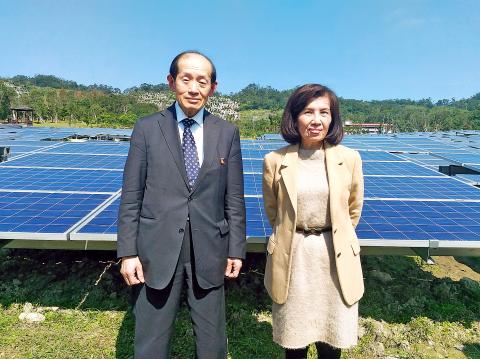Former Tatung Co (大同集團) chairman Lin Wei-shan (林蔚山) will have to serve eight years in prison for embezzlement and incurring company debt of NT$1.7 billion (US$53.8 million at the current exchange rate) after the Supreme Court on Wednesday rejected his appeal of a lower-court ruling.
After the Supreme Court announcement, Lin on Wednesday night issued a statement that said the ruling came as disappointing news and that he cannot accept the decision.
Along with the prison sentence, Lin also has to pay a fine of NT$300 million and was ordered to return NT$1.35 billion in illegal gains to the company.

Photo: Lee Ching-hui, Taipei Times
It was the final ruling on the case.
Lin, 73, was found guilty of embezzling corporate funds and for aggravated breach of trust under the Securities Exchange Act (證券交易法) and handed an eight-year prison sentence at a trial in August 2017.
Tatung Co has been the most famous Taiwanese household appliance brand for more than a century.
It was founded in 1918 and millions of Taiwanese have grown up using Tatung rice cookers, televisions, electric fans and other products known for their durability and reliability.
The firm also exported to other Asian and global markets.
Investigators found that when Lin was general manager of Tatung Co in 2000, he funneled money into Nature Worldwide Technology Corp (通達國際公司), a company headed by a female acquaintance, Chou Yun-nan (周雲楠), that produced personal computers, Unix portable servers and workstations.
When Chou ran into difficulties and her firm became debt-ridden, Lin made a personal investment in the company using NT$180 million from Tatung subsidiary Shan Chih Asset Development Co (尚志資產開發).
In 2007, Lin instructed another Tatung subsidiary, Shan Chih International Holding Co (尚志投資), to acquire Nature Worldwide Technology through an illegal buy-out to save the company from going bankrupt.
Tatung incurred debt of NT$1.7 billion due to Lin’s actions because its subsidiary was obliged to pay the debts owed by Nature Worldwide Technology after it acquired it in 2007.
The investigation found that Lin also served as the guarantor for NT$1.9 billion of bank loans taken out by Chou’s company to help clear its debts.
After the acquisition, Nature Worldwide Technology was dissolved in 2010.
The accusations of illegal asset transfers and financial irregularities prompted the Securities and Futures Investors Protection Center to file a class-action lawsuit against Lin.
The litigation charged Lin with breach of trust, violating the duties of his office as chairman of Tatung Co, while Chou was indicted.
In the first ruling, the New Taipei City District Court in June 2012 found both defendants guilty and sentenced them to four years and six months in prison for misappropriating company assets and creating fake transactions that resulted in losses to investors.
The Taiwan High Court in a second ruling handed Lin an eight-year prison sentence, along with a fine of NT$300 million in August 2014.
Additional reporter by CNA

SECURITY: As China is ‘reshaping’ Hong Kong’s population, Taiwan must raise the eligibility threshold for applications from Hong Kongers, Chiu Chui-cheng said When Hong Kong and Macau citizens apply for residency in Taiwan, it would be under a new category that includes a “national security observation period,” Mainland Affairs Council (MAC) Minister Chiu Chui-cheng (邱垂正) said yesterday. President William Lai (賴清德) on March 13 announced 17 strategies to counter China’s aggression toward Taiwan, including incorporating national security considerations into the review process for residency applications from Hong Kong and Macau citizens. The situation in Hong Kong is constantly changing, Chiu said to media yesterday on the sidelines of the Taipei Technology Run hosted by the Taipei Neihu Technology Park Development Association. With

CARROT AND STICK: While unrelenting in its military threats, China attracted nearly 40,000 Taiwanese to over 400 business events last year Nearly 40,000 Taiwanese last year joined industry events in China, such as conferences and trade fairs, supported by the Chinese government, a study showed yesterday, as Beijing ramps up a charm offensive toward Taipei alongside military pressure. China has long taken a carrot-and-stick approach to Taiwan, threatening it with the prospect of military action while reaching out to those it believes are amenable to Beijing’s point of view. Taiwanese security officials are wary of what they see as Beijing’s influence campaigns to sway public opinion after Taipei and Beijing gradually resumed travel links halted by the COVID-19 pandemic, but the scale of

A US Marine Corps regiment equipped with Naval Strike Missiles (NSM) is set to participate in the upcoming Balikatan 25 exercise in the Luzon Strait, marking the system’s first-ever deployment in the Philippines. US and Philippine officials have separately confirmed that the Navy Marine Expeditionary Ship Interdiction System (NMESIS) — the mobile launch platform for the Naval Strike Missile — would take part in the joint exercise. The missiles are being deployed to “a strategic first island chain chokepoint” in the waters between Taiwan proper and the Philippines, US-based Naval News reported. “The Luzon Strait and Bashi Channel represent a critical access

Pope Francis is be laid to rest on Saturday after lying in state for three days in St Peter’s Basilica, where the faithful are expected to flock to pay their respects to history’s first Latin American pontiff. The cardinals met yesterday in the Vatican’s synod hall to chart the next steps before a conclave begins to choose Francis’ successor, as condolences poured in from around the world. According to current norms, the conclave must begin between May 5 and 10. The cardinals set the funeral for Saturday at 10am in St Peter’s Square, to be celebrated by the dean of the College